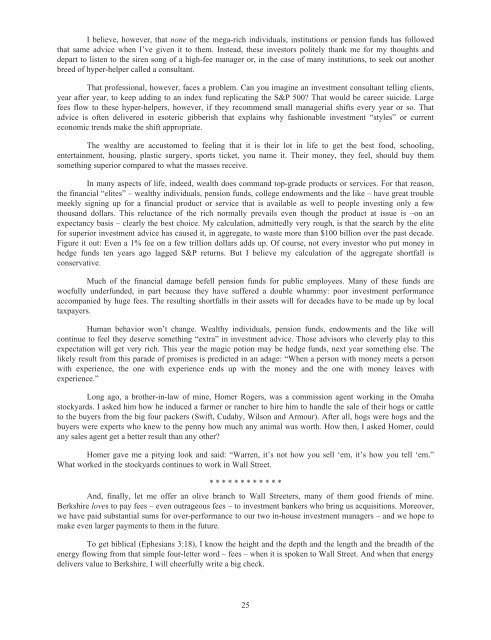Berkshire’s Performance vs the S&P 500 2
gnjtA93
gnjtA93
Create successful ePaper yourself
Turn your PDF publications into a flip-book with our unique Google optimized e-Paper software.
I believe, however, that none of <strong>the</strong> mega-rich individuals, institutions or pension funds has followed<br />
that same advice when I’ve given it to <strong>the</strong>m. Instead, <strong>the</strong>se investors politely thank me for my thoughts and<br />
depart to listen to <strong>the</strong> siren song of a high-fee manager or, in <strong>the</strong> case of many institutions, to seek out ano<strong>the</strong>r<br />
breed of hyper-helper called a consultant.<br />
That professional, however, faces a problem. Can you imagine an investment consultant telling clients,<br />
year after year, to keep adding to an index fund replicating <strong>the</strong> S&P <strong>500</strong>? That would be career suicide. Large<br />
fees flow to <strong>the</strong>se hyper-helpers, however, if <strong>the</strong>y recommend small managerial shifts every year or so. That<br />
advice is often delivered in esoteric gibberish that explains why fashionable investment “styles” or current<br />
economic trends make <strong>the</strong> shift appropriate.<br />
The wealthy are accustomed to feeling that it is <strong>the</strong>ir lot in life to get <strong>the</strong> best food, schooling,<br />
entertainment, housing, plastic surgery, sports ticket, you name it. Their money, <strong>the</strong>y feel, should buy <strong>the</strong>m<br />
something superior compared to what <strong>the</strong> masses receive.<br />
In many aspects of life, indeed, wealth does command top-grade products or services. For that reason,<br />
<strong>the</strong> financial “elites” – wealthy individuals, pension funds, college endowments and <strong>the</strong> like – have great trouble<br />
meekly signing up for a financial product or service that is available as well to people investing only a few<br />
thousand dollars. This reluctance of <strong>the</strong> rich normally prevails even though <strong>the</strong> product at issue is –on an<br />
expectancy basis – clearly <strong>the</strong> best choice. My calculation, admittedly very rough, is that <strong>the</strong> search by <strong>the</strong> elite<br />
for superior investment advice has caused it, in aggregate, to waste more than $100 billion over <strong>the</strong> past decade.<br />
Figure it out: Even a 1% fee on a few trillion dollars adds up. Of course, not every investor who put money in<br />
hedge funds ten years ago lagged S&P returns. But I believe my calculation of <strong>the</strong> aggregate shortfall is<br />
conservative.<br />
Much of <strong>the</strong> financial damage befell pension funds for public employees. Many of <strong>the</strong>se funds are<br />
woefully underfunded, in part because <strong>the</strong>y have suffered a double whammy: poor investment performance<br />
accompanied by huge fees. The resulting shortfalls in <strong>the</strong>ir assets will for decades have to be made up by local<br />
taxpayers.<br />
Human behavior won’t change. Wealthy individuals, pension funds, endowments and <strong>the</strong> like will<br />
continue to feel <strong>the</strong>y deserve something “extra” in investment advice. Those advisors who cleverly play to this<br />
expectation will get very rich. This year <strong>the</strong> magic potion may be hedge funds, next year something else. The<br />
likely result from this parade of promises is predicted in an adage: “When a person with money meets a person<br />
with experience, <strong>the</strong> one with experience ends up with <strong>the</strong> money and <strong>the</strong> one with money leaves with<br />
experience.”<br />
Long ago, a bro<strong>the</strong>r-in-law of mine, Homer Rogers, was a commission agent working in <strong>the</strong> Omaha<br />
stockyards. I asked him how he induced a farmer or rancher to hire him to handle <strong>the</strong> sale of <strong>the</strong>ir hogs or cattle<br />
to <strong>the</strong> buyers from <strong>the</strong> big four packers (Swift, Cudahy, Wilson and Armour). After all, hogs were hogs and <strong>the</strong><br />
buyers were experts who knew to <strong>the</strong> penny how much any animal was worth. How <strong>the</strong>n, I asked Homer, could<br />
any sales agent get a better result than any o<strong>the</strong>r?<br />
Homer gave me a pitying look and said: “Warren, it’s not how you sell ‘em, it’s how you tell ‘em.”<br />
What worked in <strong>the</strong> stockyards continues to work in Wall Street.<br />
************<br />
And, finally, let me offer an olive branch to Wall Streeters, many of <strong>the</strong>m good friends of mine.<br />
Berkshire loves to pay fees – even outrageous fees – to investment bankers who bring us acquisitions. Moreover,<br />
we have paid substantial sums for over-performance to our two in-house investment managers – and we hope to<br />
make even larger payments to <strong>the</strong>m in <strong>the</strong> future.<br />
To get biblical (Ephesians 3:18), I know <strong>the</strong> height and <strong>the</strong> depth and <strong>the</strong> length and <strong>the</strong> breadth of <strong>the</strong><br />
energy flowing from that simple four-letter word – fees – when it is spoken to Wall Street. And when that energy<br />
delivers value to Berkshire, I will cheerfully write a big check.<br />
25


